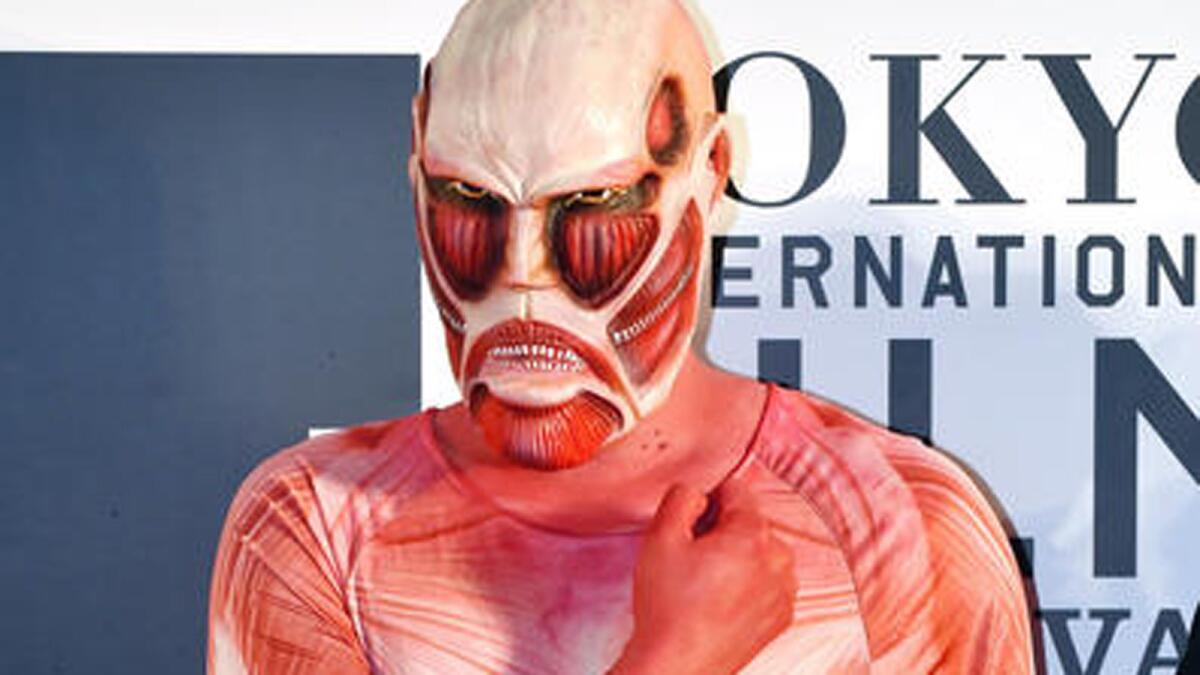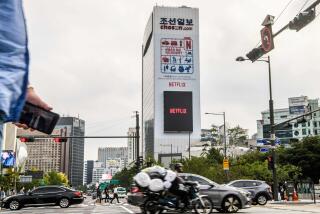Awkward: Shanghai Film Festival yanks Japanese film, urges S. Koreans to stay home

A character from “Attack on Titan” poses on the red carpet at the Tokyo International Film Festival in October.
- Share via
Reporting from Beijing — Days before its opening, the Shanghai International Film Festival has awkwardly had to yank a Japanese movie from its lineup and has urged South Korean filmmakers not to attend amid fears about the MERS virus.
Organizers pulled a Japanese animated film, “Attack on Titan,” after it was among 38 Japanese cartoons deemed “pornographic” or too violent by Chinese censorship authorities this week, state-run Chinese media outlets said.
The move illustrates the challenges Chinese film festival programmers face in selecting titles in a country with a multi-layered and opaque censorship process. The Shanghai film festival is organized by the local government.
Meanwhile, a number of South Korean participants said they had been urged not to attend the festival due to concerns about the MERS virus. Nine people have died and about 3,000 have been quarantined in the outbreak in South Korea, but China has issued no official travel ban on South Koreans. The World Health Organization says human-to-human transmission is difficult unless there is close contact.
One MERS case has been reported in mainland China -- a South Korean man in the southern province of Guangdong. A Chinese national in South Korea has also been confirmed to be infected.
“They sent an email to us about the MERS virus and suggesting to us that we not come to Shanghai,” Tae Eun-Kwon of the Korean Film Council, a government supported body that promotes South Korean films, said in a phone interview. “We were kind of confused,” she said, while adding that “we understand there is concern” about the virus.
Kwon said the council was considering canceling its booth in the festival’s film market; 11 South Korean companies were scheduled to participate, as well as several people from the film council’s headquarters.
A dozen South Korean films are included in this year’s festival screenings, and director Kang Je-kyu is up for the Golden Goblet prize for “Salut d’Amour.” Two South Koreans are nominees for the New Asian Talent Prize, Kim Dae-hwan for “End of Winter” and Jang Woo-jin for “A Fresh Start.”
Lena Han, a representative of CJ Entertainment, which has Oh Seung-Uk’s film “The Shameless” screening in competition, said the company had received the same notice. Actor So Ji-sup told the South Korean entertainment news website OSEN that he won’t make the trip to Shanghai. “I received a request that I not attend, so, unfortunately, I’ve decided not to go,” he said. Actress Bae Doona and actor Jang Dong-gun’s representatives said they would also stay home.
Asked for comment, a spokeswoman for the festival’s organizing committee said the panel was preparing a statement.
A discussion about Chinese-South Korean film co-productions, scheduled for Saturday, has been canceled, according to several Chinese-language websites that focus on South Korean entertainment.
“Attack on Titan” is based on a popular manga series created in 2009 about people trying to survive in a world of giant, naked humanoid monsters called Titans that are attempting to eat them.
The film was to be among eight Japanese movies to be screened during “Japanese Film Week” at the festival, which begins Saturday. The Shanghai festival just Wednesday had announced a new partnership with the Tokyo Film Festival, holding reciprocal screenings and engaging in other cooperative efforts.
On Monday, China published a blacklist of 38 foreign cartoons it said it was banning from websites in China, including Blood-c and Death Note. The Ministry of Culture said major online companies such as Baidu and Tencent had been warned and fined about the improper content, and eight websites had been shut down.
Liu Qiang, a senior ministry official, told state-run media that the list was “the result of evaluations by investigators, reviews by the ministry and the opinions of experts,” who deemed the content too violent or pornographic.
Jonathan Clements, author of “Anime: A History,” said “Attack on Titan” isn’t pornographic in the dictionary-definition sense.
“It’s liable to be regarded as harmful for its political content,” he said, noting that Hong Kong fans have praised it as an inadvertent metaphor for the looming presence of the mainland China in their daily lives.
“‘Attack on Titan’ features a military division that decides to overthrow its own government, and a Wall of Fear that keeps out the real world. There’s no intentional relationship to China -- in fact, much of these elements were inspired by dissenting views of Japan by the Japanese -- but you can see how such allegories might be unpopular with the Chinese censor.”
Nicole Liu in The Times’ Beijing bureau and special correspondent Steven Borowiec in Seoul contributed to this report.
Follow @JulieMakLAT for news from China
More to Read
Only good movies
Get the Indie Focus newsletter, Mark Olsen's weekly guide to the world of cinema.
You may occasionally receive promotional content from the Los Angeles Times.







